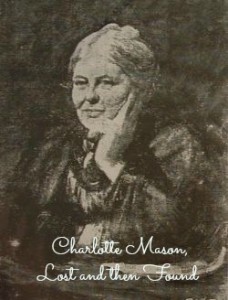I have always loved Charlotte Mason’s educational philosophy. Based on a lifetime of teaching, a view that all children, whether of the nobility or not, could learn (revolutionary in those days), and a Christian faith, Charlotte Mason’s ideas work and have done so for well over a century. They are not simply an idealist’s dream or a money-grabber’s scheme as so many current educational ideas are.
And it always makes me smile to remember that they were endorsed by the Queen Mother who wrote,
Teachers owe much to Charlotte Mason’s deep insight into child psychology and to the new principles in character building and mind training which she advocated. The gratitude of [those] who have profited by her counsel will be her enduring memorial.
But somehow our family has slipped away from many of Miss Mason’s principles: narrations, careful attention, the importance of habit, a well-rounded education. We’re still doing picture study and composer study, and our house is filled with living books, but the Charlotte Mason atmosphere is gone, and I think we need to get it back.
Charlotte Mason believed in educating the whole child and included everything from foreign languages and hands-on nature studies to physical activity, literature, art, and handicrafts. Her methods produce interested, well-educated, and well-rounded young people who have had the privilege of learning from a balanced feast of resources. She encouraged memorization, and although it wasn’t the deadening drill often associated with classical education, her results are at least as good academically, and a whole lot better in other ways.
These are all things I’ve known for years, and for many years we followed, either completely or haphazardly, the Ambleside Online curriculum, a free, accessible, and thorough guideline to implementing Charlotte Mason’s ideas.
But recently I have neglected Charlotte’s wisdom. It took a book about neuropsychology, of all things, to point me back to Charlotte’s ideas about will, duty, habit formation, and focused attention. What Charlotte Mason knew from her lifetime of working with children is now being explained in terms of synapses, neurons, and epigenetics. Of course. Truth, also truth about children and learning, is true from all angles, and Charlotte Mason’s common sense is something I should never have neglected.
Are we heading back to Miss Mason’s ideas in our homeschool? Yes, especially for my younger two. I am not well-educated enough myself to give my children a quality Charlotte Mason education in high school, so for the upper grades we need to use a guided classical education approach. But I can, ought, and will focus on Charlotte’s wisdom for my two youngest children.
Note: Although our family is indebted to Miss Mason in many ways, we do not agree with her on every point.


Same here. I love her ideas, but my follow through is lacking!
A well-timed post for Charlotte’s birthday! Best wishes for the new year too.